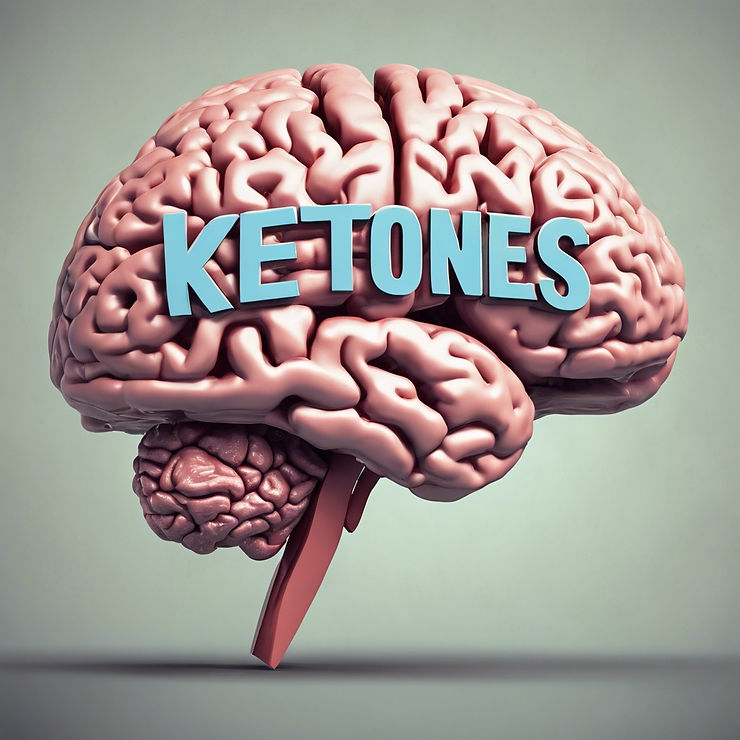Unlocking the Power of Ketones: How the Keto Diet Benefits Neurological Health
- FND Health

- May 1, 2024
- 3 min read
Updated: Jan 21
Introduction:
In recent years, the ketogenic diet has gained significant attention not only for its effectiveness in weight loss but also for its potential benefits in improving neurological health. At the heart of this diet's mechanism lies the fascinating relationship between the brain and ketones, an alternative energy source derived from fats. In this blog post, we delve into the science behind how the brain utilizes ketones for energy and explore the promising implications of the keto diet for managing neurological disorders.
Understanding Ketones:
To comprehend the role of ketones in neurological health, it's crucial to understand how they are produced and utilized by the body. When carbohydrates are restricted, as is the case with the ketogenic diet, the liver begins to break down fats into molecules called ketones. These ketones serve as an alternative fuel source for the body, particularly for the brain.

Ketones and Brain Energy:
Traditionally, the brain relies heavily on glucose, derived from carbohydrates, for energy. However, when carbohydrates are scarce, such as during periods of fasting or on a ketogenic diet, the brain seamlessly transitions to utilizing ketones for fuel. Unlike glucose, which requires insulin for cellular uptake, ketones can readily cross the blood-brain barrier and enter brain cells, where they are converted into adenosine triphosphate (ATP), the primary energy currency of cells.
Neuroprotective Effects of Ketones:
Beyond providing a source of energy, ketones exhibit several neuroprotective properties that are particularly relevant in the context of neurological disorders. Research suggests that ketones possess anti-inflammatory and antioxidant effects, which can help mitigate oxidative stress and reduce neuroinflammation, both of which are implicated in the pathogenesis of various neurological conditions.
Benefits of the Keto Diet for Neurological Disorders:
The therapeutic potential of the ketogenic diet extends to a range of neurological disorders, including epilepsy, Alzheimer's disease, Parkinson's disease, and migraine headaches. Studies have demonstrated that the keto diet can significantly reduce the frequency and severity of seizures in individuals with epilepsy, even in cases where conventional treatments have failed.

Furthermore, emerging evidence suggests that the keto diet may exert neuroprotective effects in neurodegenerative disorders like Alzheimer's and Parkinson's disease by improving mitochondrial function, enhancing synaptic plasticity, and reducing the accumulation of amyloid-beta plaques and tau protein tangles.
In addition to its effects on epilepsy and neurodegenerative disorders, the keto diet has shown promise in alleviating symptoms of migraine headaches, possibly due to its anti-inflammatory effects and modulation of neuronal excitability.
Conclusion:
The relationship between the brain and ketones is a fascinating area of research with profound implications for neurological health. By tapping into the body's innate ability to produce and utilize ketones, the ketogenic diet offers a novel approach to managing various neurological disorders. While further research is needed to fully elucidate the mechanisms underlying the therapeutic effects of the keto diet, the current evidence underscores its potential as a valuable tool in the prevention and treatment of neurological conditions.
References:
[1] - Neal EG, Chaffe H, Schwartz RH, et al. The ketogenic diet for the treatment of childhood epilepsy: a randomised controlled trial. Lancet Neurol. 2008;7(6):500-506. [Link](https://www.ncbi.nlm.nih.gov/pubmed/18456557)
[2] - Gasior M, Rogawski MA, Hartman AL. Neuroprotective and disease-modifying effects of the ketogenic diet. Behav Pharmacol. 2006;17(5-6):431-439. [Link](https://www.ncbi.nlm.nih.gov/pubmed/16940764)
[3] - Di Lorenzo C, Currà A, Sirianni G, et al. Diet transiently improves migraine in two twin sisters: possible role of ketogenesis?. Funct Neurol. 2013;28(4):305-308. [Link](https://www.ncbi.nlm.nih.gov/pubmed/24572389)




Comments